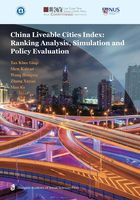
Acknowledgements
The Asia Competitiveness Institute (ACI) at Lee Kuan Yew School of Public Policy (LKYSPP), National University of Singapore (NUS) has been tracking the livability of world major cities since 2012. ACI introduced a comprehensive liveability framework that comprises of five environments, namely Economic Vibrancy and Competitiveness, Environmental Friendliness and Sustainability, Domestic Security and Stability, Socio-Cultural Conditions, and City Governance.
With rapid urbanisation continuing unabated on a global scale, cities have become the unit of global competition to attract talent, capital, and business investments. Therefore, liveability of cities has emerged as one of the most pertinent agendas for decision makers around the world. While studies on a global scale are cornerstones of the liveability series, ACI has also dedicated efforts on regional studies. The China Liveable Cities Index was part of ACI's endeavours to regional liveability.
Into its second edition, the liveable cities index for China has been further refined, with collaborative effort from both ACI and Shanghai Academy of Social Sciences (SASS). This refinement carries much deliberation by ACI and SASS to tailor the basic framework to the cultural, economic, and political characteristics in the context of China's economies. A total of 100 Chinese cities are included in this Index.
This book has benefited tremendously from the input through the discussion undertaken by field experts during the 2019 Asia Economic Forum and 2019 Annual ACI Conference. We are grateful to the discussants for their effort and dedication in evaluating the study and providing constructive suggestions for our future studies. ACI would, therefore, like to express our sincere gratitude to the following discussants:
Mr Timothy McDonald
Freelance Journalist
Dr Wang Huitong
Professor
Institute for Finance and Economics Research
Central University of Finance and Economics
Dr Wang Xingguo
Vice Dean
Shandong Academy of Social Sciences
Dr Liu Aimei
Professor
Rural Development Institute
Shandong Academy of Social Sciences
Dr Qian Jin
Assistant Researcher
Economic Research Institute
Shandong Academy of Social Sciences
We would like to extend our sincere appreciation for the encouragement and support offered by Dean Danny Quah, Dean and Li Ka Shing Professor in Economics; Professor Khong Yuen Foong, Vice Dean (Research) and Li Ka Shing Professor in Political Science; Associate Professor Suzaina Khadir, Vice Dean (Academic Affairs); Associate Professor Francesco Mancini, Associate Dean and Co-Director (Executive Education); Associate Professor Wu Alfred Muluan, Assistant Dean (Academic Affairs); Professor Yu Xinhui, Secretary of Party Committee, SASS; Professor Zhang Daogen, President of SASS; Professor Gan Chunhui, Vice President of SASS;Professor Wu Xueming, Vice Director of Institute of China Studies, SASS;and other colleagues at SASS and LKYSPP. This book would not have been possible without the support of our and administrative colleagues in SASS and ACI. In particular, we would like to extend our sincere appreciation to an able and dedicated administrative team at ACI including Yap Xin Yi, Cai Jiao Tracy, Nurliyana Binte Yusoff and Dewi Jelina Ayu Binte Johari.
We would like to note with great appreciation the high team spirit and contributions from ACI and SASS staff including Professor Tan Kong Yam, Professor Zuo Xuejin, Professor Lei Xinjun, Professor Han Hanjun, Professor Deng Lili, Professor Liu Shejian, Professor Chen Jianhua, Professor Xiao Yanhua, Professor Yu Hui, Dr Guo Haisheng, Dr Li Zezhong, Dr Guo Feng, Dr Sun Xiaoyan, Kang Woojin, Tan Kway Guan, Sumedha Gupta, Doris Liew Wan Yin, Lim Tao Oei, Rex Chan Wang Ka, Chai Duwei, and Clarice Handoko.
Finally, we place on record our appreciation for the research funding from the Ministry of Trade and Industry Singapore for supporting and funding our research.
Tan Khee Giap, Zhang Xuyao & Mao Ke
Asia Competitiveness Institute,
Lee Kuan Yew School of Public Policy,
National University of Singapore
Shen Kaiyan, Wang Hongxia,
Institute of Economics
Shanghai Academy of Social Sciences